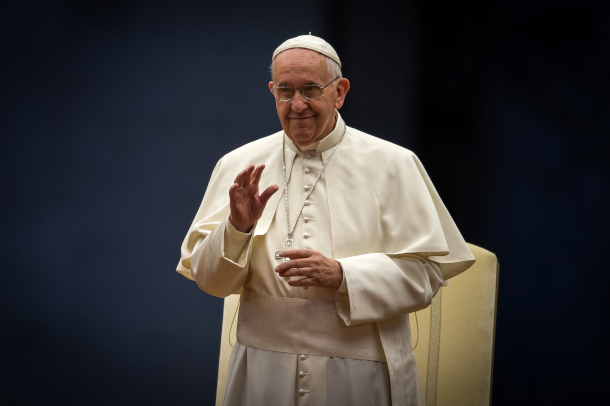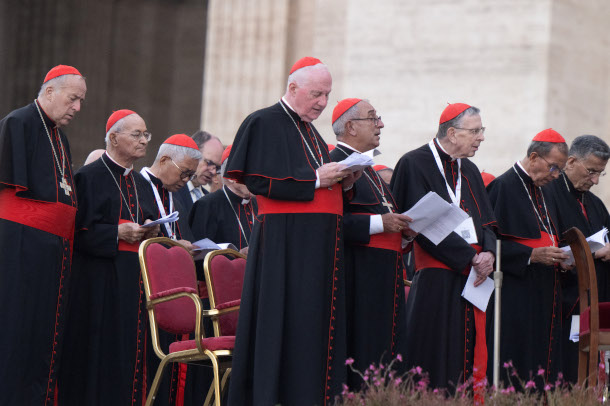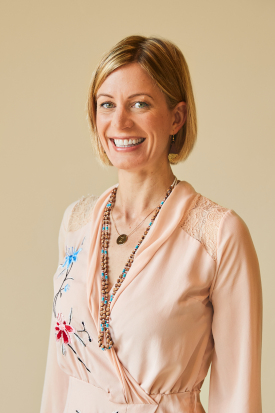New Climate Writings from Pope Francis
Air Date: Week of October 13, 2023

Pope Francis wrote his first papal document on the environment, Laudato Si’, in 2015. (Photo: Catholic Church England and Wales, Flickr, CC BY-NC-ND 2.0)
Pope Francis is back with an even bolder update to Laudato Si’, his climate change encyclical. Christiana Zenner is an Associate Professor in the Department of Theology at Fordham University and joins Host Paloma Beltran to discuss how “Laudate Deum” takes on climate denial and urges the world to act swiftly to avert climate disaster.
Transcript
DOERING: From PRX and the Jennifer and Ted Stanley Studios at the University of Massachusetts, Boston this is Living on Earth. I’m Jenni Doering.
BELTRAN: And I’m Paloma Beltran.
In June 2015, Pope Francis published a groundbreaking document that made a theological case for climate action called Laudato Si’: On Care for Our Common Home. That fall, in a rare moment of unity, nations established the landmark Paris Climate Agreement. Now, eight years later, the Pope is back with an even bolder update. In “Laudate Deum”, or “Praise God”, Pope Francis says the world is “nearing the breaking point,” condemns climate denial, and calls for urgent climate action. The Roman Catholic church he leads is the largest Christian denomination and has over a billion followers around the world. Christiana Zenner is an Associate Professor in the Department of Theology for Fordham University who is currently working on a book about the Pope’s writings on the climate.
ZENNER: This document is a total zinger compared to Laudato Si'. So whereas Laudato Si' in 2015, was extensive, it was quite long, it was measured and pastoral and expressive and philosophical. This document, Laudate Deum, is much shorter. And it is super focused on the realities of climate crises, the realism of climate change, anthropogenic climate change in particular, as a moral, ecological social problem, and on the responsibility of all people to take up action in order to address these problems. So there's a lot of really specific citation of science, there is a lot of very specific invocation about the kinds of things that need to happen. And then there is a little bit of philosophical and theological framing. But it's a really punchy document. And in some points, it's actually even a little bit snarky. He's saying to very high consuming nations, and specifically the US, he calls out the US explicitly in the penultimate paragraph of the exhortation. He says the rates of consumption are so far above China, and even more profoundly above peoples and nations that are far less developed. And so he's really taking language that is similar to the Kyoto Protocol and other kinds of agreements that see consumption by particular nations as historically problematic and in an ongoing way. It's also I think, taking pretty specific aim at the US Conference of Catholic Bishops and climate denialists. As you may know, the US Conference of Catholic Bishops has been pretty focused on pelvic issues, on abortion and contraception, etc, as its primary moral focus. And I think that it's no accident that the Pope uses a US Bishop's document from 2019 on climate change as the first citation, and then ends the document with this throwdown about US consumption. I think that's a pretty substantial frame.
DONNA HARAWAY is cited in #LaudateDeum. Wow. I never thought I would see a woman in the FN, and it’s Haraway!https://t.co/hdPLJr7XQ1
— Christiana Zenner (@christyzen) October 4, 2023
BELTRAN: It seems like Pope Francis is not beating around the bush when it comes to climate change.
ZENNER: Oh, he is not. This is a throwdown document. It's really a zinger. So he's also then, especially in the first part of the apostolic exhortation, talking about climate denialism. And just taking it down, point by point. He just says, no, this doesn't hold, this is not tenable. This is not a Catholic point of view, it's not even a reasonable point of view. And let me show you why. And so in a very effective way, he just critiques those arguments. So for example, he says that in recent years, some have chosen to deride these facts, he's speaking of climate change. Then he says, they'll bring up the allegedly solid scientific data, like the fact that the planet has always had and will have periods of cooling and warming. But then he goes on to say, they forget to mention another relevant datum, that what we are presently experiencing is an unusual acceleration of warming at such a speed that it will take only one generation in order to verify it. And he does this a number of times, this language that is basically some claim, or some deride these facts, and they'll present this kind of claim, but they forget to include this other additional claim. And so in a way that is rhetorically powerful and philosophically grounded, he's calling those folks to task and saying your philosophy is bad and your science is too. Get with it.
BELTRAN: So what does this document say about the connection between the Catholic Church and the scientific world?
ZENNER: One of the things that's really interesting, and in many respects great about the Catholic Church is that in the late 20th century especially, it has had a pretty robust engagement with contemporary sciences of the time. And this document continues that trend. So if you look at the citations, like scholars love to do, if you follow the footnotes, there are tons of citations of the Intergovernmental Panel on Climate Change, these kinds of consensus documents that indicate the patterns, extent, and implications of anthropogenic climate changes. And so not only are those in the footnotes supporting a range of claims, there's also explicit numbers throughout the document. So I would say there's a huge relationship between the Catholic Church and science in this document. Because a lot of people think, oh, Catholic Church. Science. Well, Galileo, that didn't go well. But when we delve into it, you know, absolutely, yes, lots of problems going on in that era for sure. But there are also always really interesting moments that religious institutions, in this case, the Catholic Church, can assess developments in science and either hunker down and refuse to engage the questions raised, or say, wow, this looks like a big issue. What does this mean for theology, for morality, and for the project of being human? And that's what the Pope has chosen to do.

The Pope’s exhortation was published at the open of October 2023’s Synod of Bishops in the Vatican. (Photo: Catholic Church England and Wales, Flickr, CC BY-NC-ND 2.0)
BELTRAN: Christiana, what surprised you the most about Laudate Deum?
ZENNER: What surprised me the most? Well, I think there are a few things. One is how pithy and direct it is. The Pope knows what he's doing in this. And the structure of the apostolic exhortation, as well as the tone is remarkably direct, very readable, and, in many ways, at least from an interdisciplinary ethics perspective, irrefutable on the dynamics of climate change, and the science behind it, economic growth presumptions and the dynamics of consumerism, and what Pope Francis calls in a slightly more philosophical and theological way, the technocratic paradigm, which is a fetishization of economic efficiency and technological innovation. The presumption that those alone will solve ecological or social problems. So I was really, frankly stunned and really happy to see someone who is in a position of authority, yes, in a hierarchical patriarchal context that has massive problems. But as we saw in the reception of the 2015 Laudato Si' document, he's in a position to get people's attention. Another set of things that surprised me and didn't. There's one citation in there, citation 41, of feminist philosopher of science, Donna Haraway. She's an American, a long standing professor at the University of California Santa Cruz, someone who's been very critical of normative gender hierarchies as they play out in the practice and conceptualization of science, and a real advocate for multi-species relations. So she shows up in footnote 41, which is shocking, because she's on record as being anti-Catholic, anti-institutionally-Catholic, and anti-theistic in that sense. So, how on earth did this citation get into the apostolic exhortation? And what does it mean? I am fascinated and a number of us are trying to dig into this.
BELTRAN: So Pope Francis cited Donna Haraway, what did he say there?
ZENNER: So she is cited in a section on anthropocentrism. The idea that humans are at the center functionally, as well as morally, of the earth and of theological significance. And so Pope Francis says, the technocratic paradigm, which he had earlier critiqued, can deceive us by making us forget that the entire world is a contact zone. And he cites this book by Donna Haraway, called When Species Meet. And then the section goes on to talk about well, we can't have like a full anthropocentrism where humans are the only or exclusive focus, we need a situated anthropocentrism that recognizes the interrelations and the limits to human centrality and power. It is completely fascinating that the Pope chooses to cite her or the Pope's ghost writers, don't know which one. But it's kind of a two part thing. There's that whole reaction of oh my gosh, what on earth? And then the second part is, isn't it interesting, that of all the women to cite, all of the experts who happen to be women, the one he cites is Donna Haraway. And not the many, many, many women within the Catholic Church. Celia Deane-Drummond, Brazilian ecofeminist liberation theologian Ivone Gebara, there are so many brilliant scholars who are women who have been working with eco-theologies and orders of nuns who have been implementing ideas like this that far preceded even Laudato Si' in 2015. So the citation of Haraway is doubly bizarre. Because why not cite women who are also engaging the work of the church? And one skeptical answer is, well, there's a long history of excluding them. And maybe it would mean that their critiques would have to be taken seriously. I don't know. But it's one viable hypothesis.
BELTRAN: In Laudate Deum, Pope Francis specifically discusses COP28, the United Nations Climate Change Conference. What do you make of these mentions?
ZENNER: I think it's really interesting and exciting that Pope Francis is focusing this document on COP28. So clearly, this document is meant to have a practical political lifestyle impact. And what I think is so distinctive about his approach in Laudate Deum, this 2023 document is that he has a whole section on COP28. And he says that if we are confident in the capacity of human beings to transcend their petty interests, and to think in bigger terms, we can keep hoping that COP28 will allow for a decisive acceleration of energy transition with effective commitments subject to ongoing monitoring. And he goes on, he says, there needs to be binding forms of energy transitions that meet three conditions: efficient, obligatory, and readily monitored. And then he later says, and everyone needs to commit to them, it can't just be a kind of exceptional thing. So I think this is, this is pretty remarkable, because he's basically saying, here's what you guys need to do: get it together. And in Section 58, he has a defense of climate activists. This is really important, because around the world, we're seeing the silencing and the jailing of climate activists in a range of contexts. And so into that space, Pope Francis says in paragraph 58, in conferences on the climate, the actions of groups negatively portrayed as radicalized, radicalized is in quotes, tend to attract attention. But he continues, in reality, they are filling a space left empty by society as a whole, which ought to exercise a healthy pressure. So this idea that there's need for what he calls a multilateralism from below, that the voices of activists, the voices of people affected by these things, that this matters, I think, is really, really significant.

Christiana Zenner is an associate professor at Fordham University’s department of theology. (Photo: Courtesy of Christiana Zenner)
BELTRAN: And after the Pope has written and published this, what happens next? What are Catholics expected to do with this?
ZENNER: On the one hand, it's in the written record, the Vatican archives, as a pretty authoritative document, that anyone in the world or anyone of goodwill, who is the intended audience of this document according to Pope Francis, that anyone in the world can access. I think it will be a resource for nonprofit organizations and branches of the church and parish communities who really want to take up the call to reflect theologically and in terms of ethical action, and maybe even in terms of activism. I don't know how priests and other formal representatives of the church, especially in the United States will engage it. I think that's one of the questions that remains to be seen. But as I've said, it's a pretty fascinating, concise, pithy zinger of a document that is doing something exciting, so I'm interested to see what happens with it.
BELTRAN: Christiana Zenner is an associate professor of theology, science and ethics at Fordham University. Christiana, thanks so much for taking the time with us today.
ZENNER: Thank you for having me.
Links
Pope Francis’ “Laudate Deum” apostolic exhortation
Listen to our interview with Christiana Zenner on Laudato Si’ in 2015
Living on Earth wants to hear from you!
Living on Earth
62 Calef Highway, Suite 212
Lee, NH 03861
Telephone: 617-287-4121
E-mail: comments@loe.org
Newsletter [Click here]
Donate to Living on Earth!
Living on Earth is an independent media program and relies entirely on contributions from listeners and institutions supporting public service. Please donate now to preserve an independent environmental voice.
NewsletterLiving on Earth offers a weekly delivery of the show's rundown to your mailbox. Sign up for our newsletter today!
 Sailors For The Sea: Be the change you want to sea.
Sailors For The Sea: Be the change you want to sea.
 The Grantham Foundation for the Protection of the Environment: Committed to protecting and improving the health of the global environment.
The Grantham Foundation for the Protection of the Environment: Committed to protecting and improving the health of the global environment.
 Contribute to Living on Earth and receive, as our gift to you, an archival print of one of Mark Seth Lender's extraordinary wildlife photographs. Follow the link to see Mark's current collection of photographs.
Contribute to Living on Earth and receive, as our gift to you, an archival print of one of Mark Seth Lender's extraordinary wildlife photographs. Follow the link to see Mark's current collection of photographs.
 Buy a signed copy of Mark Seth Lender's book Smeagull the Seagull & support Living on Earth
Buy a signed copy of Mark Seth Lender's book Smeagull the Seagull & support Living on Earth

